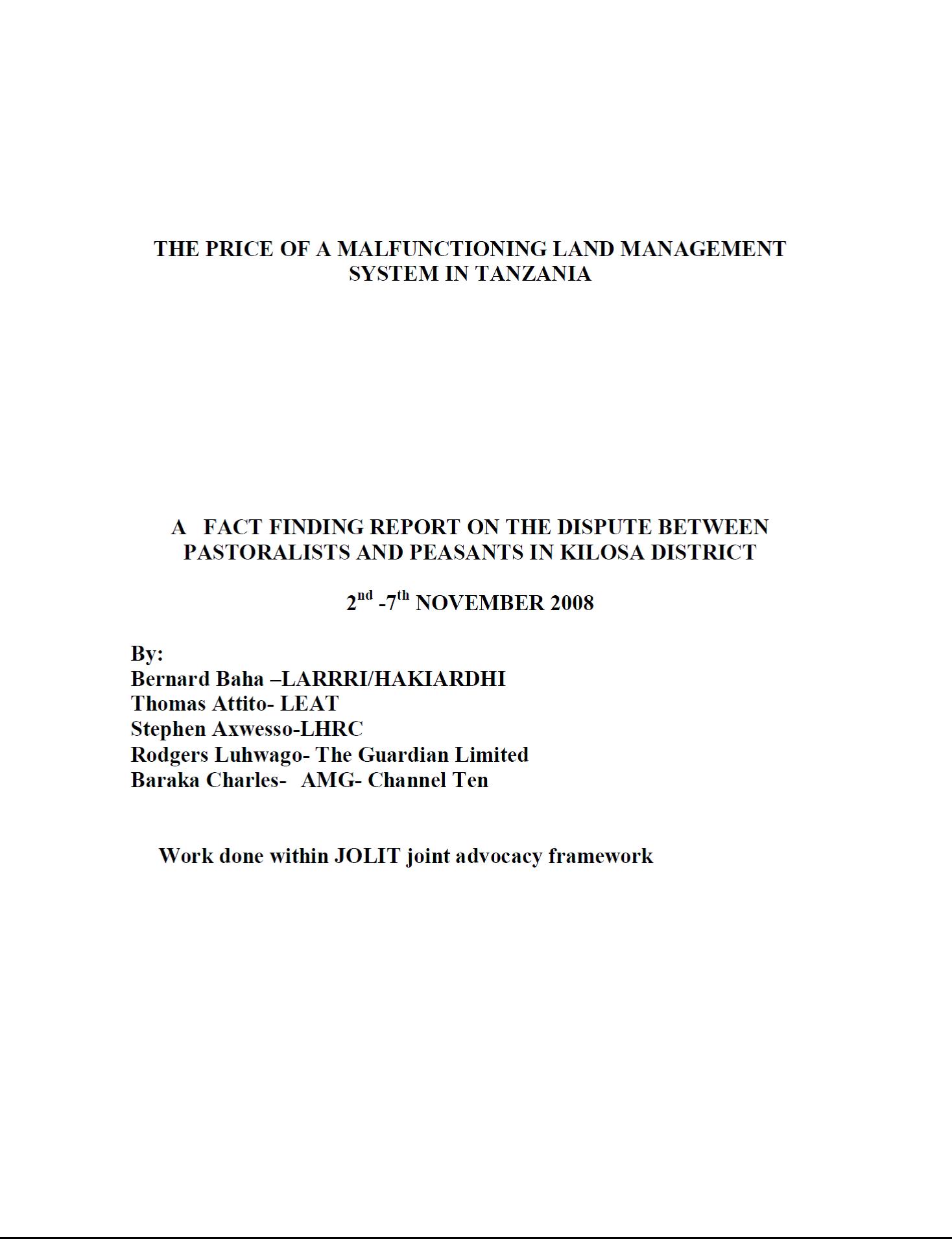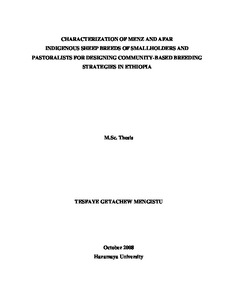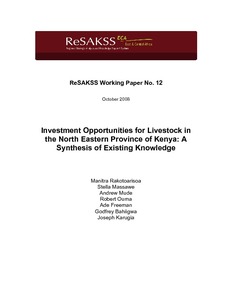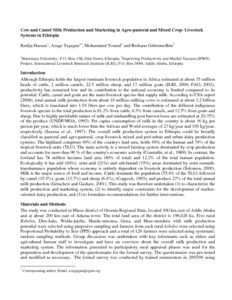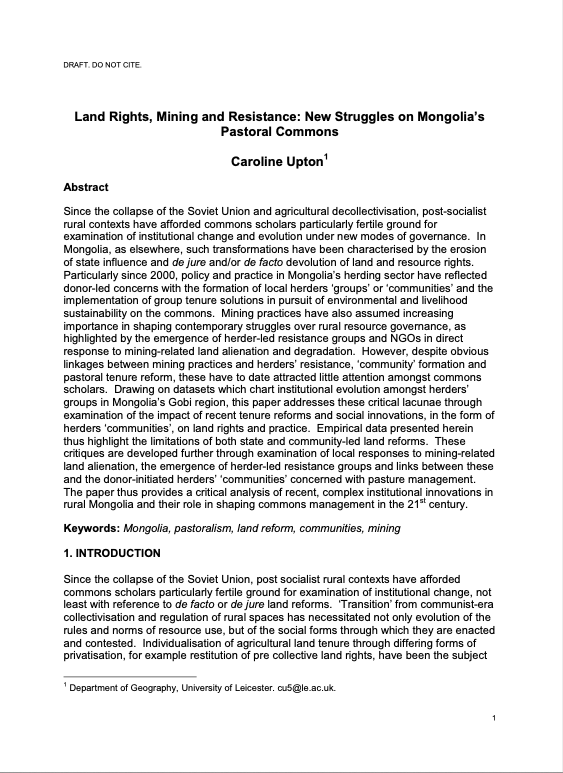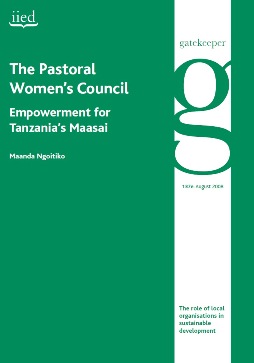The Price of a Malfunctioning Land Management System in Tanzania
It is almost a decade now since the fights between Pastoralists and peasants broke out in Kilosa district Morogoro region in December 2000 claiming tens of people’s lives and causing irreparable losses and damages their properties. While the wounds of that dark record are still fresh in some of the minds of the communities in Kilosa, another very serious fight between the same or rather similar groups occurred this October prompting the media and human rights activists to find some ways to intervene in a bid to find lasting solutions for the problems.
Characterization of Menz and Afar indigenous sheep breeds of smallholders and pastoralists for designing community-based breeding strategies in Ethiopia
This study aimed at understanding of existing sheep breeding practices, identifying sheep breeding goals and characterizing the morphological and biometrical characters of Menz and Afar sheep breeds in their habitat as a step towards developing sustainable sheep breeding strategy. The study was conducted by implementing single visit questionnaire, observing and recording of sheep morphological characters, and by recording body weight and body measurements. The survey revealed that the mean sheep flock size per household was 31.6 in Menz and 23.0 in Afar area.
Investment Opportunities for Livestock in the North Eastern Province of Kenya: A Synthesis of Existing Knowledge
Pastoralism is the dominant livelihood activity in the North Eastern Province (NEP) of Kenya. It is supplemented only by a limited amount of agriculture along the rivers. The province faces various developmental challenges including chronic poverty and food insecurity, low human capital and poor health standards, high vulnerability to climate change, poor infrastructure, insecurity and low crop and livestock productivity.
Cow and camel milk production and marketing in agro-pastoral and mixed crop-livestock systems in Ethiopia
Programa de Acción Nacional contra la Desertificación 2008.
El objetivo fundamental del Programa de Acción Nacional contra la Desertificación (PAND) es contribuir al logro del desarrollo sostenible de las zonas áridas, semiáridas y subhúmedas secas del territorio nacional y, en particular, la prevención o la reducción de la degradación de las tierras, la rehabilitación de tierras parcialmente degradadas y la recuperación de tierras desertificadas.
The Transformation of the Afar Commons in Ethiopia: State Coercion, Diversification, and Property Rights Change among Pastoralists
The major economic activity for pastoralists is animal husbandry. The harshenvironment in which herders raise their livestock requires constant mobility toregulate resource utilization via a common property regime. In contrast to themobile way of life characterizing pastoralism, agriculture as a sedentary activity isonly marginally present in the lowlands of the Afar regional state in Ethiopia.Nevertheless, this study reveals a situation where the traditional land–usearrangements in Afar are being transformed due to the introduction of farming.
Land Rights, Mining and Resistance: New Struggles on Mongolia’s Pastoral Commons
Since the collapse of the Soviet Union and agricultural decollectivisation, post-socialist rural contexts have afforded commons scholars particularly fertile ground for examination of institutional change and evolution under new modes of governance. In Mongolia, as elsewhere, such transformations have been characterised by the erosion of state influence and de jure and/or de facto devolution of land and resource rights.
The role of abandoned pastoral settlements in the dynamics of African large herbivore communities
A number of studies have begun to show the large impact that pastoralism has on African savanna ecosystems. Here we look at the impact of abandoned settlements on the distribution of the large ungulates of Amboseli, Kenya.
Monthly dung counts show that all 9 species studied are attracted by settlements for up to a century after abandonment.
Women's Empowerment in Pastoral Societies
When reading about women in pastoral societies it is common to find reference to their marginalised roles, their hardship, their oppression and their lack of power as opposed to men’s domination, men’s ownership, men’s power and associated patriarchal relations.
The Pastoral Women’s Council: Empowerment for Tanzania’s Maasai
The Pastoral Women’s Council (PWC) is a community-based organisation established in 1997 in Tanzania. It was founded to promote the development of Maasai pastoralist women and children by facilitating their access to education, health, social services and economic empowerment. It seeks to address women’s marginalisation in patriarchal Maasai culture, as well as the poverty among the Maasai that has long been underpinned by land access restrictions for pastoralists, hunters and gatherers.
Browsing on Fences. Pastoral land rights, livelihoods and adaptation to climate change.
This publication brings together the inputs made by over 120 participants in a webbased forum organised in 2006 and managed by the International Land Coalition (www.landcoalition.org) on Pastoral Land Rights. The paper has been further enriched with material from a number of projects from around the world and the results of another web-based forum organised by the World Initiative for Sustainable Pastoralism (www.iucn.org/Wisp) in 2007, focusing on Climate change, adaptation and pastoralism.


